






Wheelchairs are helpful for people who can only take a few steps before needing to rest or have difficulty walking long distances.
Manual wheelchairs are available in many different configurations and all of the options can be overwhelming to choose from.
It is helpful to understand the basic types in order to choose the model that best fits the user’s needs. Here is everything you need to know about the 11 types of manual wheelchairs.
Designed to be self-propelled by the user or pushed by a companion or caregiver. They are available with a wide variety of colors and features.
Rigid frames are preferred for users who will propel themselves with their arms due to more effective energy propulsion. The primary advantage of folding wheelchairs is their portability.
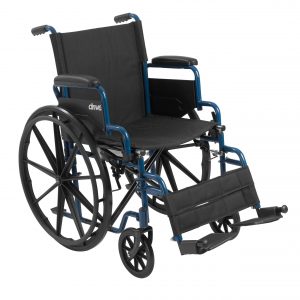 Drive Medical 16” Blue Streak Wheelchair with swing-away footrests |
Durable, economical with basic features such as fixed armrests and swing-away footrests.
They are collapsible, transportable and feature large rear wheels so they can be propelled by the user or caregiver.
The steel frames are sturdy but can be difficult to push on uneven surfaces or long periods of time.
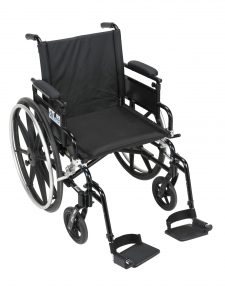
Drive Medical Viper Plus GT Wheelchair with desk-length arms and swing-away footrests |
Most users move their wheelchairs by pushing the arms forward while holding on to the rims of the wheels.
Large 24” diameter rear wheels are needed with hand rims, swivel front casters and hand brakes.
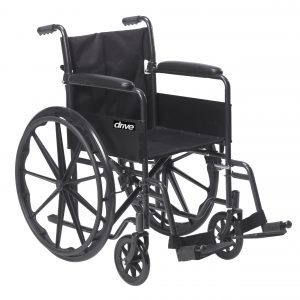 Drive Medical Silver Sport 1 Wheelchair |
Some users prefer to remove the foot rests and use their feet to move the wheelchair for short distances on flat surfaces. Lightweight frames with adjustable seat-to-floor height work best.
A lower seat-to-floor height may be needed so that the user’s feet can comfortably reach the floor. Transport wheelchairs are suitable for foot propulsion as the large rear wheels are not needed.
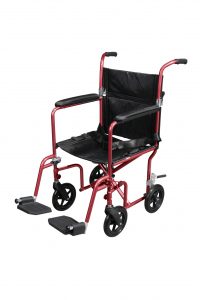 Drive Medical Deluxe Fly-Weight Aluminum Transport Chair with Removable Casters |
Folding aluminum or steel frames are designed to be pushed by a caregiver or family member. They feature simple construction, small 12” rear wheels and a narrow seat.
They cannot be self-propelled by the user’s arms because the small rear wheels and brakes are out of reach.
Transport wheelchairs are ideal for short term use and travel because they require minimal storage space. They are not recommended for users who require elevating legrests.
Transport wheelchairs are also helpful for users with dementia who could be injured by touching the wheels when they are in motion.
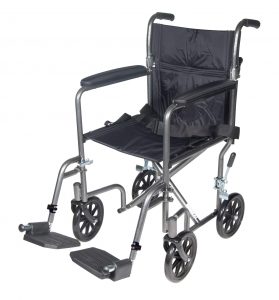 Drive Medical 17” Steel Transport Chair |
These lightweight designs have collapsible frames, making them ideal for travel and intermittent use.
The wheelchair seat and components are folded into a compact shape that can fit into the trunk of a vehicle or storage space.
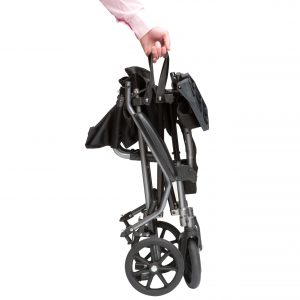 Drive Medical Travelite Transport Chair with carry bag |
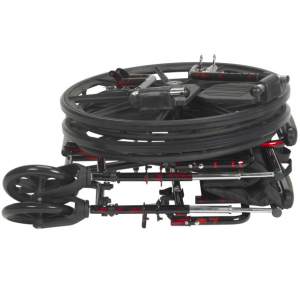
|
Typically weighing less than 35 lbs, these aluminum and titanium frames are easier to push and stow than steel frames.
Some models may be self-propelled while others must be pushed by a companion.
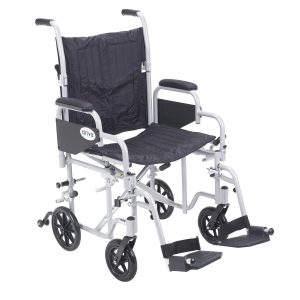
Drive Medical Poly-Fly High Strength, Lightweight Wheelchair/Flyweight Transport Chair Combo Weight: 33 lbs |
Minimalist designs generally weigh less than 25 lbs, making them able to maneuver through narrow halls and doorways.
They are ideal for short-term and intermittent use.
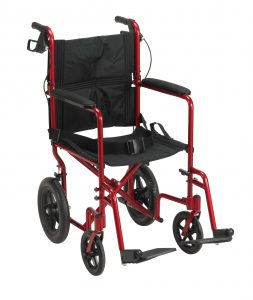 Drive Medical Lightweight Expedition Aluminum Transport ChairWeight: 19 lbs |
|
Reinforced steel frames are more durable and have greater weight capacities than standard wheelchairs.
Seat widths are available from 20” to 30” with a maximum weight capacity of 700 lbs. Enhanced bracing supports provide safety and stability for comfort.
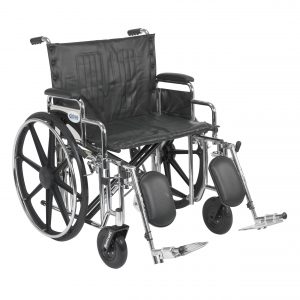
Drive Medical 24” Bariatric Sentra Extra Heavy-Duty Wheelchair Weight capacity: 500 lbs |
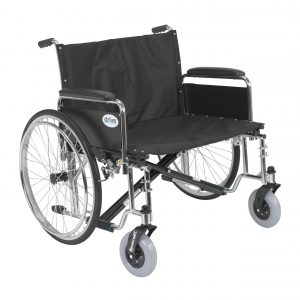
Drive Medical 30” Bariatric Sentra EC Heavy-Duty, Extra-Extra-Wide Wheelchair Weight capacity: 700 lbs |
The adjustable seat-to-back angle is recommended for users who have difficulty sitting upright due to weak torso muscles or spinal deformities.
The high back provides support for the neck and shoulders when the user is in a reclined position.
The ability to recline is important to distribute pressure and reduce the risk of skin breakdown when the user sits in the chair for extended periods of time.
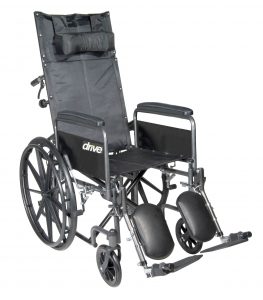
|
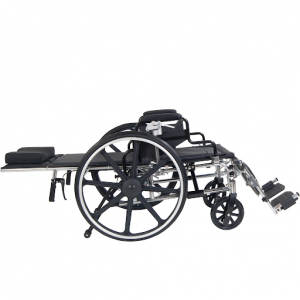
|
The entire seat tilts to change the user’s orientation while keeping the same hip, knee and ankle angles.
These types of manual wheelchairs can provide up to 45 degrees of tilt with redistributed pressure to prevent skin breakdown. The legs and torso can be elevated at the same time to relieve swelling and low blood pressure.
Improved comfort and reduced fatigue enable users to spend more time out of bed. Tilting the chair back fully also reduces the effort required for positioning the user before transferring to the bed.
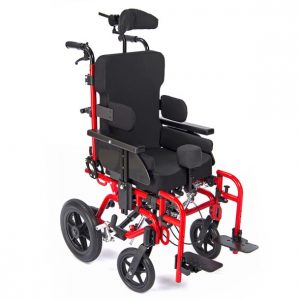
Drive Medical Kanga 14” Pediatric Folding Tilt-in-Space Wheelchair |
Consultation with a physician is essential before selecting and using wheelchairs. Correct sizing of the frame and seat is essential to prevent injury or skin breakdown. Physical and occupational therapists can guide selection of wheelchair features and provide training on how to use wheelchairs safely.
At HomeCare Hospital Beds we want to help you make an informed decision.
If you have any doubts on which manual wheelchair type is fit for you, please contact our HomeCare Hospital Beds team, so we can help you make the right choice.
Call us today toll free at 877-414-0002 or email us at info@homecarehospitalbeds.com.
Learn more about Hospital Bed Safety .
Read our latest Hospital Bed Buying Guide.




| Cookie | Duration | Description |
|---|---|---|
| cookielawinfo-checkbox-analytics | 11 months | This cookie is set by GDPR Cookie Consent plugin. The cookie is used to store the user consent for the cookies in the category "Analytics". |
| cookielawinfo-checkbox-functional | 11 months | The cookie is set by GDPR cookie consent to record the user consent for the cookies in the category "Functional". |
| cookielawinfo-checkbox-necessary | 11 months | This cookie is set by GDPR Cookie Consent plugin. The cookies is used to store the user consent for the cookies in the category "Necessary". |
| cookielawinfo-checkbox-others | 11 months | This cookie is set by GDPR Cookie Consent plugin. The cookie is used to store the user consent for the cookies in the category "Other. |
| cookielawinfo-checkbox-performance | 11 months | This cookie is set by GDPR Cookie Consent plugin. The cookie is used to store the user consent for the cookies in the category "Performance". |
| viewed_cookie_policy | 11 months | The cookie is set by the GDPR Cookie Consent plugin and is used to store whether or not user has consented to the use of cookies. It does not store any personal data. |